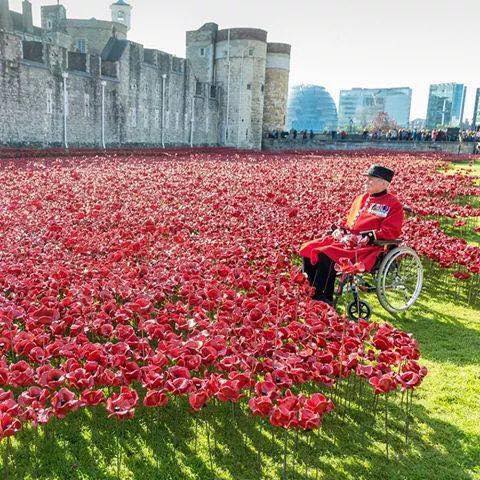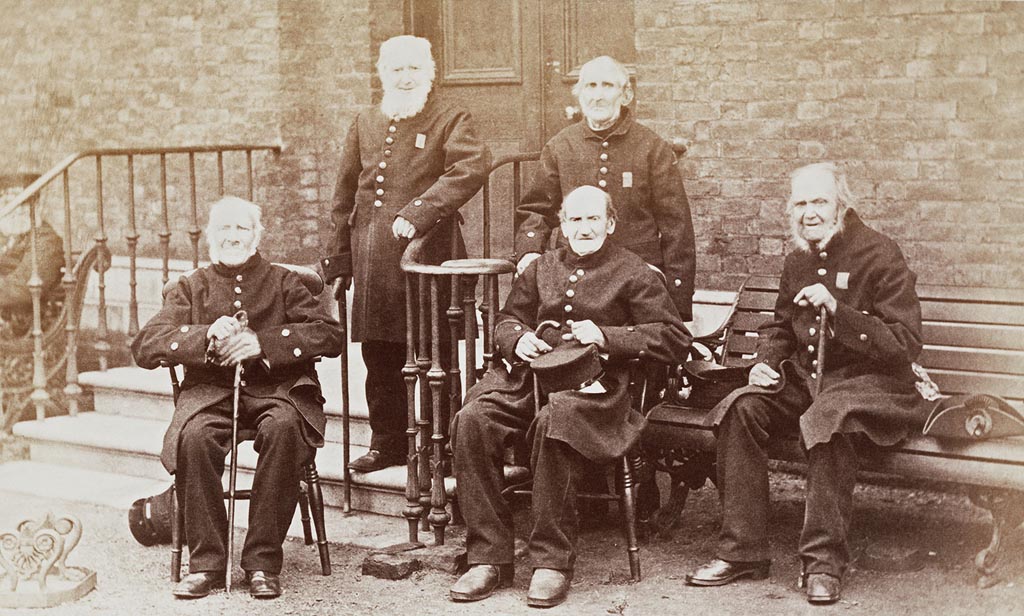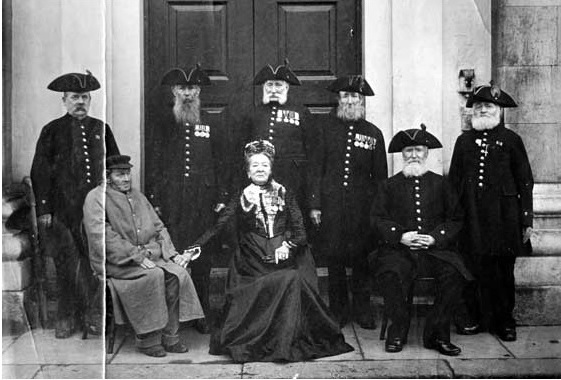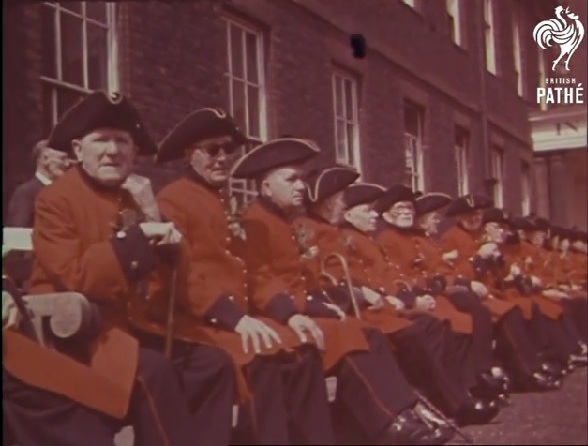But what about earlier times? With the thought that photographs capture a single moment in time, a recent browse of historical photos produced the remarkable images below.
Today, in 2014, you are looking at men born more than 200 years ago in the 18th century, who, as young men, all fought at the Battle of Waterloo in 1815. After I found the above photograph on the internet, I was intrigued to see if there were photographs of other Chelsea Pensioners who took part in other nineteenth century British conflicts.
The 1912 photograph has captured a moment of tenderness (and reassurance?) between Mrs Evans and one of the pensioners.
When looking into their faces and eyes, it struck me that all these Chelsea Pensioners (if you removed their mutton chops!) could have been First or Second World War veterans.
 |
Chelsea Pensioner at the Tower of London, 2014 |
The continuity of time shown in these photographs is incredible. None of the men would look out of place if they "stepped" into one of the other photographs...
Have you forgotten yet?...
For the world's events have rumbled on since those gagged days,
Like traffic checked while at the crossing of city-ways:
And the haunted gap in your mind has filled with thoughts that flow
Like clouds in the lit heaven of life; and you're a man reprieved to go,
Taking your peaceful share of Time, with joy to spare.
But the past is just the same--and War's a bloody game...
Have you forgotten yet?...
Look down, and swear by the slain of the War that you'll never forget.
Do you remember the dark months you held the sector at Mametz--
The nights you watched and wired and dug and piled sandbags on parapets?
Do you remember the rats; and the stench
Of corpses rotting in front of the front-line trench--
And dawn coming, dirty-white, and chill with a hopeless rain?
Do you ever stop and ask, 'Is it all going to happen again?'
Do you remember that hour of din before the attack--
And the anger, the blind compassion that seized and shook you then
As you peered at the doomed and haggard faces of your men?
Do you remember the stretcher-cases lurching back
With dying eyes and lolling heads--those ashen-grey
Masks of the lads who once were keen and kind and gay?
Have you forgotten yet?...
Look up, and swear by the green of the spring that you'll never forget.
Aftermath by Siegfried Sassoon, 1919.
For more information about Chelsea Pensioners, you may enjoy these sites
- Film archives from the 1920s onwards about the Chelsea Pensioners
- Royal Hospital Chelsea: Home of the Chelsea Pensioners
- How the 17th century Hospital is being brought into the 21st century
*_*_*_*_*_*_*_*_*_*_*_*_*_*
I look forward to sharing with you more of my discoveries over the coming months - see you next time on this blog on 18th December 2014. In the meantime, you can catch me on my blog Essex Voices Past or on twitter @EssexVoicesPast
You may also be interested on my previous posts on this blog
- October 2014: Writing local history
- September 2014: Hidden from history - the scandalous Redit women of Suffolk
- April 2014: Happy Easter 1916?
- March 2014: Who do you think they were?
- February 2014: Family History Show and Tell
- January 2014: Family history is like a box of chocolates - you never know what you're gonna get
© Essex Voices Past



Wow! A fantastic use of 'mirror' years. Such an interesting post. You really brought the past into the present.
ReplyDeleteThought provoking post!
ReplyDeleteA very moving post. Some years back I was eagerly awaiting the online publication of the Chelsea Pensioner Records to trace information on Peter Pringle described in the 1851 census as a "blind Chelsea Pensioner". I found details of his service at Cuidad Rodrigo in the Spanish Peninsular War - a great find.
ReplyDeleteLovely photos! Incidentally... anyone researching Chelsea pensioners who ended up in Queensland should start with the two indexes to Imperial Pensions on the Queensland State Archives Web site.
ReplyDeleteWonderful photos and such an interesting view of the past - I have two great x grandfathers that fought against Napoleon and then emigrated to Australia and were given Veteran's grants of land in NSW so I found it particularly interesting
ReplyDelete